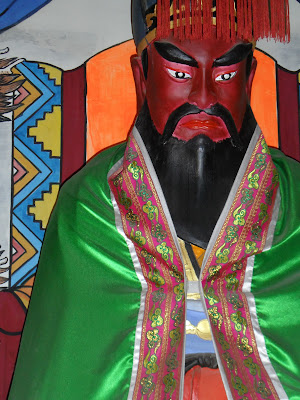One of the many delights of this trip is getting lost. It's not that I particularly enjoy taking wrong turns or putting in extra miles, but it often leads to pleasant surprises. I once asked a man in a shiny SUV how to get to Tehran. 'Tehran?' he said. 'Why go to Tehran?' Two small children in the back were giggling. 'Come home with us. We'll have lunch, I'll show you around. You can stay as long as you like. Please don't say no.' And I'll never forget that time in Spain when I wasn't sure whether the road I was on was in fact the right road. I stopped. There was not a soul in sight. After a minute or so a bus pulled over. An elderly lady dressed in conservative blue got off, her spine bent not only by old age but also by a leather suitcase she was carrying. I addressed her gently and asked for directions. 'Cross the river at the next bridge,' she told me in rapid Spanish, and in the same breath asked where I was from. I told her. 'And you've come all the way by bicycle?' I said yes. She tutted, took my hand and said something I didn't quite follow. Then she picked up her suitcase and walked off. When I opened my hand I found a plastic rosary. Now, I wouldn't even know how to say a Hail Mary, but that simple act of well-wishing touched me tremendously. I've kept it in the back pocket of my cycling jersey ever since.
Wherever you go, people can relate to a stranger trying to find his way. Language barriers aren't an issue. I always start with the local equivalent of 'hello' or 'good afternoon' to break the ice, have a go at the name of the place I'm looking for, and try to look a bit clueless. If this triggers a lengthy explanation in a language I don't know, which is usually the case, there's always enough pointing involved for me to get a sense of where I'm supposed to be heading. I thank the person who's come to my rescue, he or she says something to the effect of 'you're welcome' or 'don't mention it', and we're on our merry way again. It's human communication distilled to its essence, a successful exchange of information against the odds.
 |
| Chinese people doing Chinese things |
Not so in China. The trouble starts when I try to catch someone's attention with a simple 'nihao'. I can see the panic flare up in their eyes. What, me? Before they get a chance to run I corner them and slowly state the place I'm looking for, taking care not to make it sound like a question. In Chinese, intonation is not the frilly thing it is in Western languages. My phrasebook has a good example of what happens if you get it wrong: mess up the tones of the word 'w
àiji
āgu
ān' and you're introducing yourself not as a diplomat but as a rubber U-bend pipe. But no matter how hard I try, most people simply don't get what I'm driving at. Even if I do manage to get my point across, it often turns out to be a complete waste of energy. Not only is every syllable of their explanation lost on me, it's usually accompanied by such a confusion of gestures and exclamations that I end up none the wiser. 'So let me get this straight,' I will say. 'Do I turn left (I point to my left) or right (I point to my right)?' A single nod of the head. Yes.
More than ever I now depend on road signs. On main thoroughfares these tend to be bilingual, but on country roads they read like small puzzles. Several times a day I stop to match the Chinese characters I find on road signs with the characters on my Chinese map, which I then compare with the place names on my English map. Memorising them takes some imagination. The characters for the city of Xi'an, for instance, resemble a pi symbol taking a foot bath and a stick man crossing his legs. The trick here is to remember more than just the first character or you'll end up in, say, Pingyao rather than Pingliang.
This really is a wonderful country. The scenery can be stunning, the food is great and on the whole the people are nice. But in China even the most hardened traveller will sometimes feel like an illiterate deaf-mute left to his own devices.








